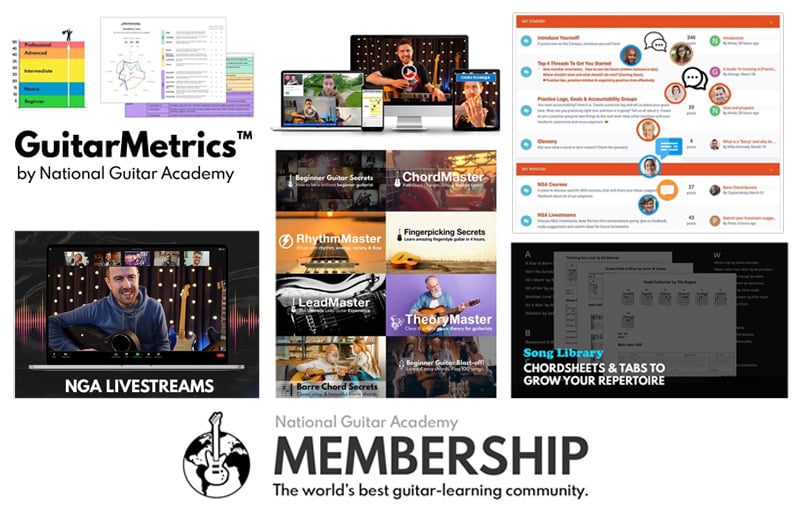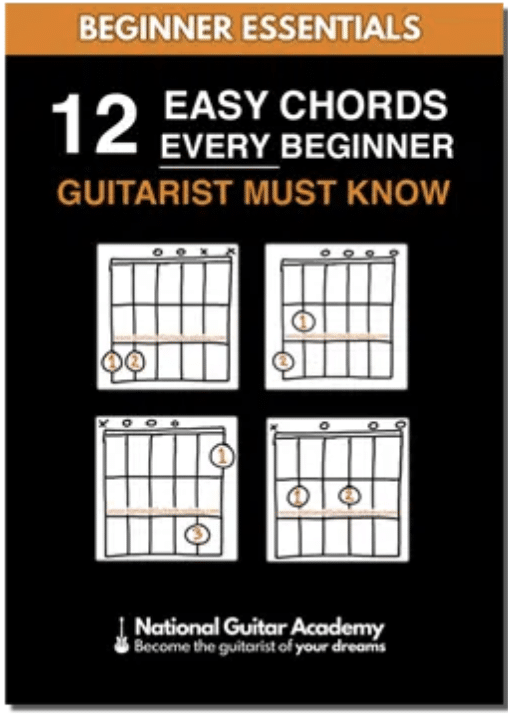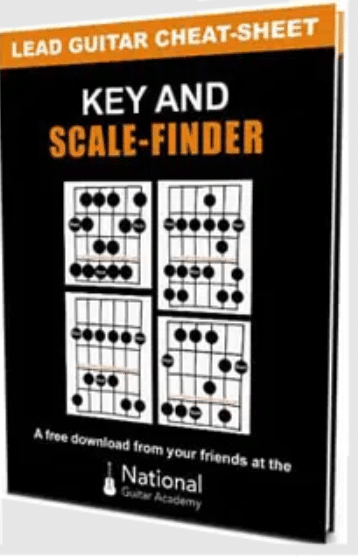2) Two Octave E Blues Scale
Here’s the tab for a two octave blues scale in the key of E.
We’re still using the first half of the regular blues scale, we’ve just added a few notes to complete the second octave.
3) Two Octave G Major Pentatonic Scale
Here’s the tab for a two octave G major pentatonic scale.
Can you see how the first half of the G major pentatonic is exactly same as the previous scale pattern? All we’ve done is add notes to complete the octave.
4) Two Octave G Major Scale
Here’s the tab for a two octave G major scale. This one’s a finger twister so make sure you practice it slowly!
5) Two Octave E Minor Scale
This E minor scale can be a little tricky to play, so make sure you practice it slowly and carefully. Nail each note!

Join over 100,000 guitar learners and subscribe to our guitar-tips-by-email service. (It's free.) We'll send you a series of lessons that will move you to the next level of your guitar journey. Learn how everything fits together quickly, easily and effectively. We share ninja tips (for instant fun!) but also timeless fundamentals that will deepen your understanding. To become a better guitarist click here to see our guitar courses Want us to make a guitar-learning plan that is customised to you? Click here for GuitarMetrics™Want free guitar tips and video lessons delivered to your inbox?


Get our best guitar tips & videos
Our Guitar Courses
Get your personalised guitar-learning plan 🎸
What Is A Scale?
A scale is a group of musical notes. Technically, you could pick a few different notes and group them together, and call it a scale.
Scales usually contain 5-12 different notes. Scales fall into two main categories, major and minor.
Along with major and minor scales, you also get pentatonic and blues scales.
If you can have a good understanding of these scales, you’ll be rocking in no time.
There’s loads more to learn about guitar scales, click here to find out more: Learn Guitar Scales In 8 Easy Steps
Why do I need to know beginner guitar scales?
Now you’re probably wondering… “Yeah it’s great learning all these scales, but do I actually need to know them?”
In short, the answer is yes. You need to know guitar scales dude! We’re going to show you 3 reasons why you need to learn guitar scales.
1) Scales Improve Your Musicality
Learning scales is a great way of increasing your musicality.
Musical scales can be used to create melodies. They also allow you to improvise!
Without scales, it’s almost impossible to create a solo or to write a tune. It’s SO important that you know how to play beginner guitar scales.
Here are a few scenarios when you could use beginner guitar scales:
- If you’re in a band, and you’re asked to take a solo.
- If you want to write a melody line to a song you’ve written.
- If you want to write a rockin’ guitar riff.
If you’d like to learn more about lead guitar, check out these articles:
Beginner guitar scales are essential to know if you want to create amazing sounding solos.
Check out this killer article from Guitar World, to find out what the 50 greatest guitar solos of all time are: 50 Greatest Guitar Solos
2) Learning Scales Enhances Your Technique
Scales are a great way of enhancing your guitar technique. Fretting notes and playing individual strings can be hard when you’re first starting.
By learning beginner guitar scales, you’re forcing yourself to play things correctly. This is perfect for developing your guitar technique!
3) Scales Make You Sound Amazing
Learning guitar scales is a quick fire way of sounding amazing.
If you learn guitar scales, it gives you the skill to take guitar solos, to write melodies and to enhance your technique.
We guarantee that if you learn guitar scales, you WILL become an amazing guitarist.
When can I use these guitar scales?
It’s great learning guitar scales. However, it’s pointless knowing guitar scales if you don’t know when you can use them.
In this section, we’re going to show you when you can use beginner guitar scales.
To know when we can use beginner guitar scales, we need to understand a little about musical keys.
What’s a musical key?
A musical key is a group of scales and chords which work together.
How does this relate to guitar scales?
Okay, listen up. This is important.
Each guitar scale belongs to a specific musical key. We can break musical keys into two types.
Those are major keys and minor keys.
- For every major key, you have a major scale.
- For every minor key, you have a minor scale.
Pretty simple right?
How does this work?
What this means is that if you have a song in a major key, you can play the following scales.
- The Major Scale.
- The Major Pentatonic Scale.
If a song is a minor key, you can use these scales:
- The Minor Scale.
- The Minor Pentatonic.
All you have to worry about is what key that song or backing track is in.
For example, if you want to practice the G major scale/G major pentatonic scale, your backing track/song has to be in the key of G major.
Or, let’s say you wanted to practice improvising in the key of E minor.
You could use a:
- E Minor Scale.
- E Minor Pentatonic Scale.
Can you see how the names of these scales relates to the key?
This works for ANY key, so for example if you learnt a C major scale, you could play it over a song in the key of C.
It doesn’t matter whether you’re improvising, writing a melody or creating guitar riffs. As long as your musical key lines up with the appropriate scale, you’ll be fine.
How do I work out a musical key?
Okay, now we understand how musical keys relate to beginner guitar scales.
Let’s find out how we can work out a musical key.
It’s SO easy, this trick is going to blow your minds. I hope you’re ready for this..
To work out the key of a song, all you have to do is check the first and last chord of a song. That’s it!
It almost sounds too easy doesn’t it? Let’s put it into practice.
Here’s a chord progression:
G Major |E Minor |C Major |D Major |G Major
So if we follow our rule, let’s check the first and last chord of this progression.
As you can see, the first and last chord is G major.
Therefore, the key of this song is in G major.
See, easy right!
Let’s try another one.
What key do you think this progression is in?
E Minor |A Minor |D Minor |E Minor
If you look at the first and last chords of this progression, you can tell that this chord progression is in the key of E minor.
To learn more about musical keys, go here: Guitar Keys: An Essential Guide
Why is this useful to know?
This is so important to understand! If you can work out a musical key, it means you can use your beginner guitar scales.
By using your beginner guitar scales in a musical context, you will become a better guitarist.
What Type of Guitarist Are You?
Take our 60-second quiz & get your results: Take The Quiz
Join the world's best online guitar school 🌎
- Get your own personalised guitar learning plan (customised just for YOU).
- World-class online guitar courses. Learn at your own pace.
- Community Campus & Learning Forum - A friendly community! Connect with our team & students. 😊
- Beginner Song library with chordsheets, tabs and tips. (Songs suitable for all levels!)
- Regular live streams, seminars and Q&A sessions - Learn from world-class guitar educators. Get all your questions answered!
Click here to learn more about National Guitar Academy membership 
Cool Guitar T-shirts 😎
Look cooler! Check out our merch: Click here to see our merch store
Want free guitar tips and video lessons delivered to your inbox?
Join over 100,000 guitar-learners and subscribe to our guitar-tips-by-email service. (It's free.)
We'll send you a series of lessons that will move you to the next level of your guitar journey.
Learn how everything fits together quickly, easily and effectively. We share ninja tips (for instant fun!) but also timeless fundamentals that will deepen your understanding.


Get our best guitar tips & videos
Popular Lessons
How To Learn Guitar: An 11-Step Programme For Beginners
How To Choose The Perfect Beginner Guitar
More Cool Guitar Stuff
Learn about National Guitar Academy: About Us
Join us on Facebook for daily guitar tips.
Listen to our Learn Guitar Podcast for rapid guitar progress.
Check out our free chord lessons.










